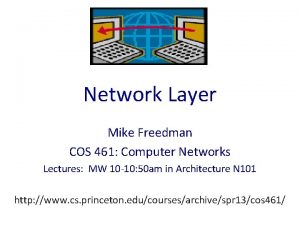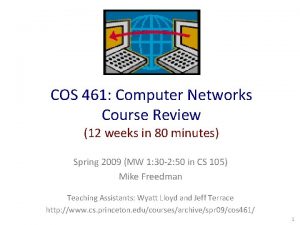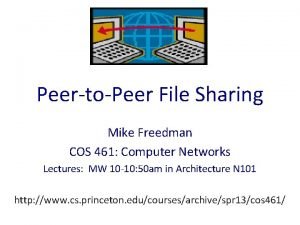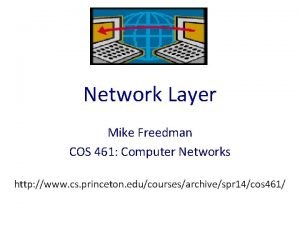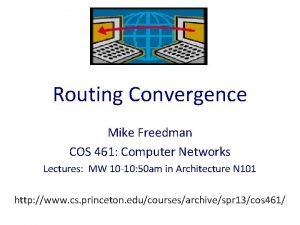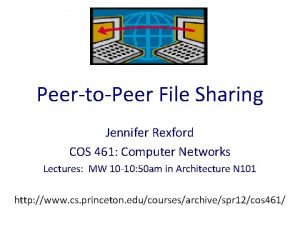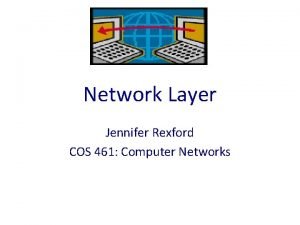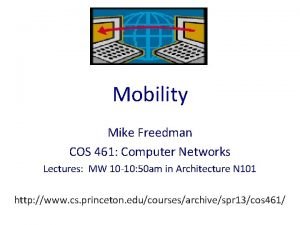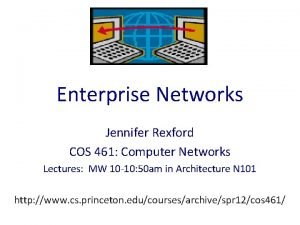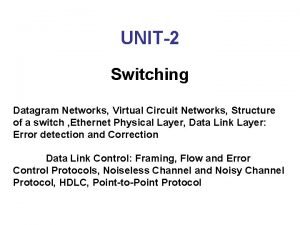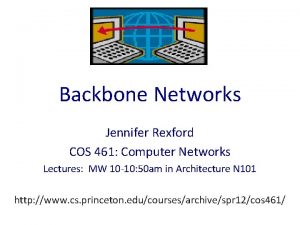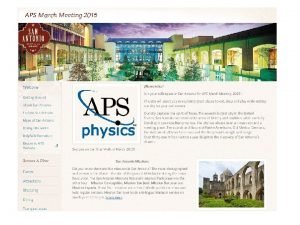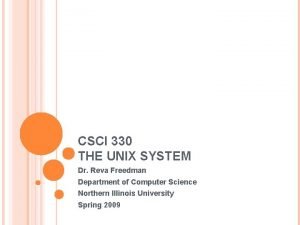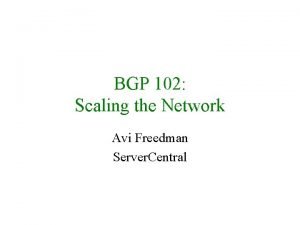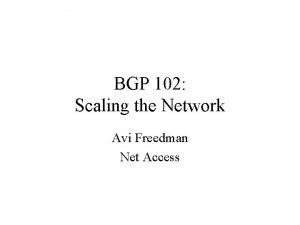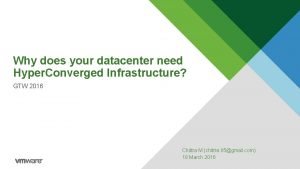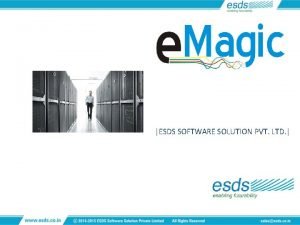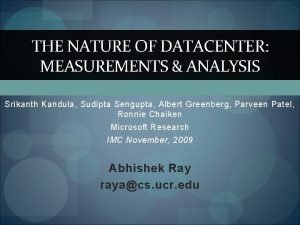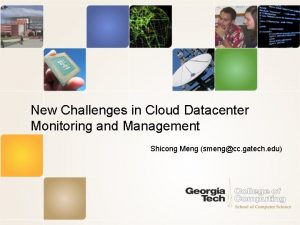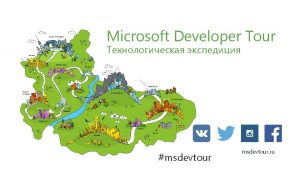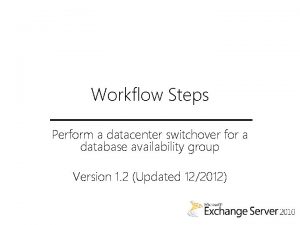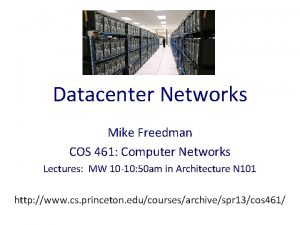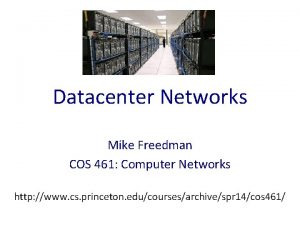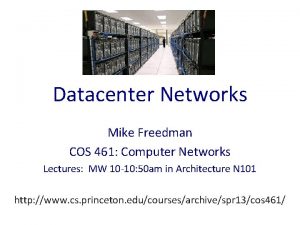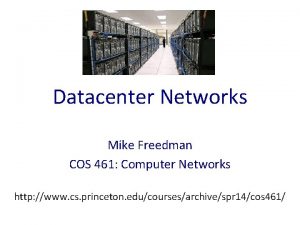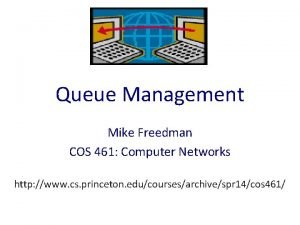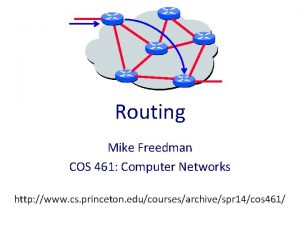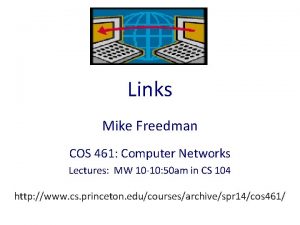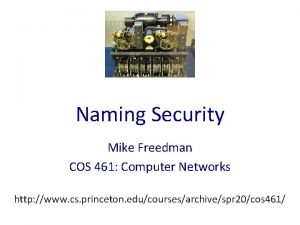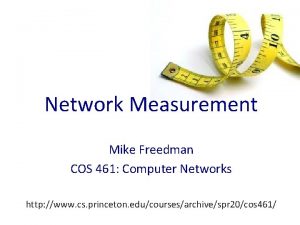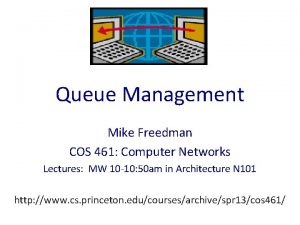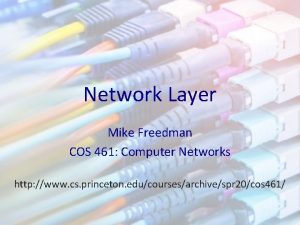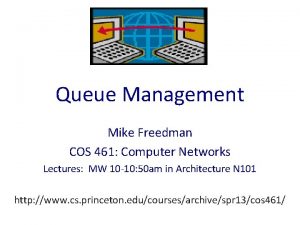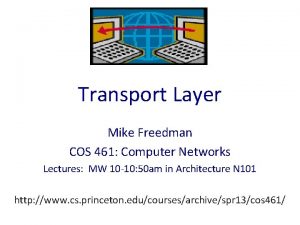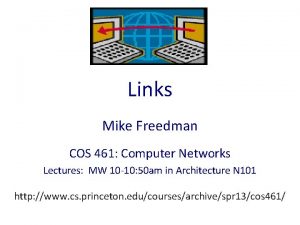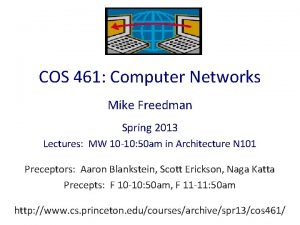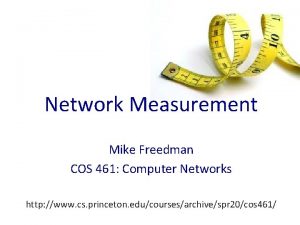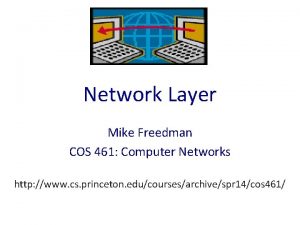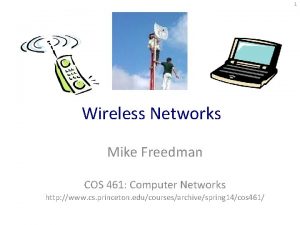Datacenter Networks Mike Freedman COS 461 Computer Networks































- Slides: 31

Datacenter Networks Mike Freedman COS 461: Computer Networks Lectures: MW 10 -10: 50 am in Architecture N 101 http: //www. cs. princeton. edu/courses/archive/spr 13/cos 461/

Networking Case Studies Datacenter Enterprise Backbone Cellular Wireless 2

Cloud Computing 3

Cloud Computing • Elastic resources – Expand contract resources – Pay-per-use – Infrastructure on demand • Multi-tenancy – Multiple independent users – Security and resource isolation – Amortize the cost of the (shared) infrastructure • Flexible service management 4

Cloud Service Models • Software as a Service – Provider licenses applications to users as a service – E. g. , customer relationship management, e-mail, . . – Avoid costs of installation, maintenance, patches, … • Platform as a Service – Provider offers platform for building applications – E. g. , Google’s App-Engine, Amazon S 3 storage – Avoid worrying about scalability of platform 5

Cloud Service Models • Infrastructure as a Service – Provider offers raw computing, storage, and network – E. g. , Amazon’s Elastic Computing Cloud (EC 2) – Avoid buying servers and estimating resource needs 6

Enabling Technology: Virtualization • Multiple virtual machines on one physical machine • Applications run unmodified as on real machine • VM can migrate from one computer to another 7

Multi-Tier Applications • Applications consist of tasks – Many separate components – Running on different machines • Commodity computers – Many general-purpose computers – Not one big mainframe – Easier scaling 8

Componentization leads to different types of network traffic • “North-South traffic” – Traffic to/from external clients (outside of datacenter) – Handled by front-end (web) servers, mid-tier application servers, and back-end databases – Traffic patterns fairly stable, though diurnal variations • “East-West traffic” – Traffic within data-parallel computations within datacenter (e. g. “Partition/Aggregate” programs like Map Reduce) – Data in distributed storage, partitions transferred to compute nodes, results joined at aggregation points, stored back into FS – Traffic may shift on small timescales (e. g. , minutes) 9

North-South Traffic Router Front-End Proxy Web Server Data Cache Web Server Database 10

East-West Traffic Distributed Storage Map Tasks Reduce Tasks Distributed Storage 11

Datacenter Network 12

Virtual Switch in Server 13

Top-of-Rack Architecture • Rack of servers – Commodity servers – And top-of-rack switch • Modular design – Preconfigured racks – Power, network, and storage cabling 14

Aggregate to the Next Level 15

Modularity, Modularity • Containers • Many containers 16

Datacenter Network Topology Internet CR CR . . . AR AR S S S A A … A ~ 1, 000 servers/pod AR AR . . . • • Key CR = Core Router AR = Access Router S = Ethernet Switch A = Rack of app. servers 17

Capacity Mismatch? CR 1 CR AR AR S S S S A A … A 3 2 S S A A … A . . . “Oversubscription”: Demand/Supply A. 1 > 2 > 3 B. 1 < 2 < 3 C. 1 = 2 = 3 18

Capacity Mismatch! CR S A AR AR S S ~ 40: 1 ~ S 5: 1 S A … A A CR ~ 200: 1 S A … A . . . AR AR S S S A A … A Particularly bad for east-west traffic 19

Layer 2 vs. Layer 3? • Ethernet switching (layer 2) – Cheaper switch equipment – Fixed addresses and auto-configuration – Seamless mobility, migration, and failover • IP routing (layer 3) – Scalability through hierarchical addressing – Efficiency through shortest-path routing – Multipath routing through equal-cost multipath 20

Datacenter Routing Internet CR DC-Layer 3 CR . . . AR AR SS SS SS A A … A DC-Layer 2 ~ 1, 000 servers/pod == IP subnet AR AR . . . • • Key CR = Core Router (L 3) AR = Access Router (L 3) S = Ethernet Switch (L 2) A = Rack of app. servers 21

Outstanding datacenter networking problems remains… 22

Network Incast Web Server Data Cache • Incast arises from synchronized parallel requests – Web server sends out parallel request (“which friends of Johnny are online? ” – Nodes reply at same time, cause traffic burst – Replies potential exceed switch’s buffer, causing drops 23

Network Incast Web Server Data Cache • Solutions mitigating network incast A. B. C. D. E. Reduce TCP’s min RTO (often use 200 ms >> DC RTT) Increase buffer size Add small randomized delay at node before reply Use ECN with instantaneous queue size All of above 24

Full Bisection Bandwidth • Eliminate oversubscription? – Enter Fat. Trees – Provide static capacity • But link capacity doesn’t “scale-up”. Scale out? – Build multi-stage Fat. Tree out of k–port switches – k/2 ports up, k/2 down – Supports k 3/4 hosts: 48 ports, 27, 648 hosts 25

Full Bisection Bandwidth Not Sufficient • Must choose good paths for full bisectional throughput • Load-agnostic routing – Use ECMP across multiple potential paths – Can collide, but ephemeral? Not if long-lived, large elephants • Load-aware routing – Centralized flow scheduling, end-host congestion feedback, switch local algorithms 26

Conclusion • Cloud computing – Major trend in IT industry – Today’s equivalent of factories • Datacenter networking – Regular topologies interconnecting VMs – Mix of Ethernet and IP networking • Modular, multi-tier applications – New ways of building applications – New performance challenges 27

Load Balancing 28

Load Balancers • Spread load over server replicas – Present a single public address (VIP) for a service – Direct each request to a server replica 10. 10. 1 Virtual IP (VIP) 192. 121. 10. 10. 10. 2 10. 10. 3 29

Wide-Area Network Servers Datacenters Router DNS Server DNS-based site selection Servers Internet Clients 30

Wide-Area Network: Ingress Proxies Servers Datacenters Router Servers Router Proxy Clients 31
 Cos 461
Cos 461 Cos 461
Cos 461 Cos 461
Cos 461 Cos 461
Cos 461 Cos 461
Cos 461 Cos 461
Cos 461 Cos 461
Cos 461 Cos 461
Cos 461 Cos 461
Cos 461 Cos 461
Cos 461 Cos 461
Cos 461 Difference between virtual circuit and datagram network
Difference between virtual circuit and datagram network Backbone networks in computer networks
Backbone networks in computer networks Young and freedman
Young and freedman Current resistance and electromotive force
Current resistance and electromotive force Sears zemansky
Sears zemansky Danielle freedman
Danielle freedman Rabbi david freedman
Rabbi david freedman Neil freedman
Neil freedman Steve freedman
Steve freedman 461 enneagram
461 enneagram Reva freedman
Reva freedman Avi freedman
Avi freedman Avi freedman net worth
Avi freedman net worth Micro data center rhône alpes
Micro data center rhône alpes Converged datacenter
Converged datacenter Datacenter management suite
Datacenter management suite Micro data center
Micro data center Datacenter
Datacenter Datacenter
Datacenter Microsoft datacenter tour
Microsoft datacenter tour Exchange datacenter switchover
Exchange datacenter switchover

